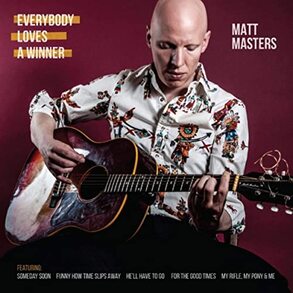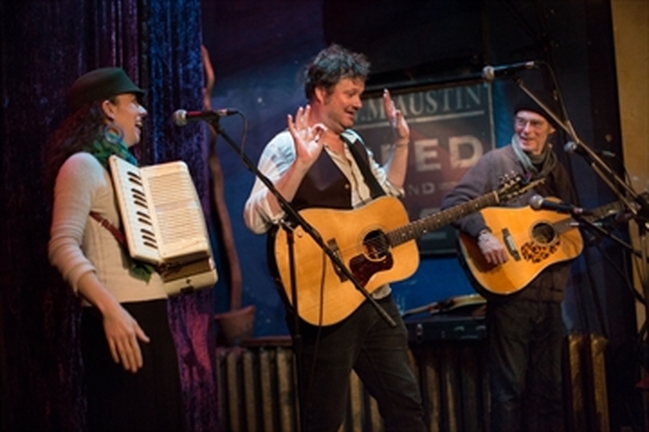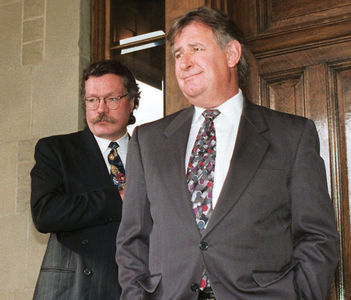| Album Review by Jocelyn Burgener INTRODUCTION Music and memories go hand in hand. Hearing a favourite song can evoke a memory with tangible clarity. Cover songs are unique as they have the capacity to enhance those cherished memories. A dedicated cover album, Everybody Loves a Winner, recently released by Matt Masters, sets a new standard for covers. Letting loose with his incredible vocal range, these country classics still pull on the heart strings. With material spanning six decades, Everybody Loves a Winner enables musicians to re-interpret material and engage a new audience. |
MY RIFLE, MY PONY & ME
Originally recorded by Dean Martin and emerging talent Ricky Nelson, My Pony was released in 1959. Together with Nelson’s success as a teen idol on the pop charts, the song is recognized as one of the first country/pop crossover recordings. In the sixties, My Pony was recognized as one of the Top 100 country songs by the Western Writers of America.
The recording tells the story of the solitary life of a cowboy. The use of whistling and harmonica, traditional country instruments, reinforce the loneliness of the cowboy life.
On the album, Matt partners with Barney Bentall to great effect. Their collaboration makes the song familiar for a contemporary audience, while still maintaining its Western flavour. I felt an intimate connection with the song’s harmonies as the musicians weaved their voices together.
SOMEDAY SOON
Originally recorded by Ian Tyson, the song tells the story of a woman who is contemplating forsaking her parents’ wishes to follow the cowboy she loves. He loves the rodeo, and she wants to come along for the ride.
Harmonizing with Jill Barber, Matt’s arrangement of the song is more upbeat than the original. This creates the sense that the main character has the freedom to follow her love. She is not afraid to go.
HE’LL HAVE TO GO
He’ll Have to Go is a country classic by Jim Reeves. Recorded in 1959, the song is about a man asking his sweetheart to tell him if she feels the same way. While the lyrics suggest that he is prepared to end the relationship (“Do you want me? Answer yes or no, darling I will understand”), he is desperate for her to stay. The original version is slow, melodic and dramatic.
Matt’s version is lighter, faster, more upbeat. The man is no longer desperate for her to stay, but instead wants to know where he stands. The change in tempo reflects societal changes in the relationship. The new version leaves the possibility that he is free to choose if he wants to leave. A simple question, but the answer is more complex.
CONCLUSION
Country music is a unique genre. Matt has challenged the traditional rhythm of country songs. In Walk a Mile in My Shoes Matt’s vocal treatment makes the song more contemporary. It is Matt’s powerful voice which enables him to generate a variety of interpretations. In conclusion, the listener will find a new appreciation for cover songs.
SONG LIST
WALK A MILE IN MY SHOES
SOME DAY SOON*
FUNNY HOW TIMES SLIPS AWAY
EVERYBODY LOVES A WINNER
PAPA WAS A RODEO
HE’LL HAVE TO GO*
MY RIFLE, MY PONY AND ME*
THEN YOU CAN TELL ME GOODBYE
Originally recorded by Dean Martin and emerging talent Ricky Nelson, My Pony was released in 1959. Together with Nelson’s success as a teen idol on the pop charts, the song is recognized as one of the first country/pop crossover recordings. In the sixties, My Pony was recognized as one of the Top 100 country songs by the Western Writers of America.
The recording tells the story of the solitary life of a cowboy. The use of whistling and harmonica, traditional country instruments, reinforce the loneliness of the cowboy life.
On the album, Matt partners with Barney Bentall to great effect. Their collaboration makes the song familiar for a contemporary audience, while still maintaining its Western flavour. I felt an intimate connection with the song’s harmonies as the musicians weaved their voices together.
SOMEDAY SOON
Originally recorded by Ian Tyson, the song tells the story of a woman who is contemplating forsaking her parents’ wishes to follow the cowboy she loves. He loves the rodeo, and she wants to come along for the ride.
Harmonizing with Jill Barber, Matt’s arrangement of the song is more upbeat than the original. This creates the sense that the main character has the freedom to follow her love. She is not afraid to go.
HE’LL HAVE TO GO
He’ll Have to Go is a country classic by Jim Reeves. Recorded in 1959, the song is about a man asking his sweetheart to tell him if she feels the same way. While the lyrics suggest that he is prepared to end the relationship (“Do you want me? Answer yes or no, darling I will understand”), he is desperate for her to stay. The original version is slow, melodic and dramatic.
Matt’s version is lighter, faster, more upbeat. The man is no longer desperate for her to stay, but instead wants to know where he stands. The change in tempo reflects societal changes in the relationship. The new version leaves the possibility that he is free to choose if he wants to leave. A simple question, but the answer is more complex.
CONCLUSION
Country music is a unique genre. Matt has challenged the traditional rhythm of country songs. In Walk a Mile in My Shoes Matt’s vocal treatment makes the song more contemporary. It is Matt’s powerful voice which enables him to generate a variety of interpretations. In conclusion, the listener will find a new appreciation for cover songs.
SONG LIST
WALK A MILE IN MY SHOES
SOME DAY SOON*
FUNNY HOW TIMES SLIPS AWAY
EVERYBODY LOVES A WINNER
PAPA WAS A RODEO
HE’LL HAVE TO GO*
MY RIFLE, MY PONY AND ME*
THEN YOU CAN TELL ME GOODBYE













 RSS Feed
RSS Feed
